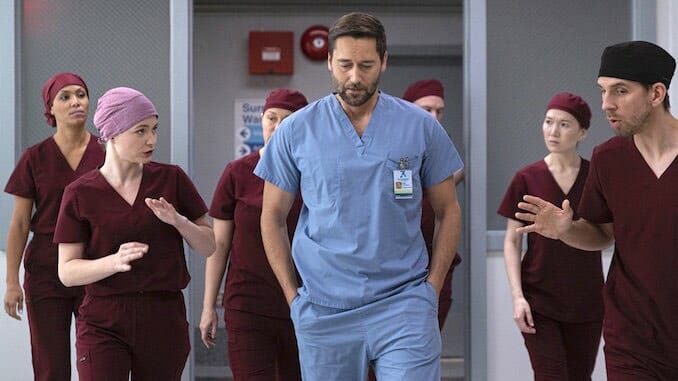TV Shows Have Largely Left the Pandemic Behind—Is that a Good Thing?
Photo Courtesy of NBC
There have been no press releases or grand announcements, but it would appear that COVID storylines and television shows have consciously uncoupled.
While so many shows used their most recent seasons to awkwardly, often irresponsibly, wedge the pandemic into their storytelling, now most series have abandoned it. From one point of view, this is a terrific development. Let’s all hope we never have to hear characters awkwardly explain how they are “vaccinated” or “tested negative” or have been “strictly quarantining” again.
But still, it’s unsettling. Children under 12 still cannot be vaccinated. Masks are still recommended for all indoor activities. The death toll is still rising. There’s talk of booster shots and a possible winter variant. COVID and its ravaging social, economic, and health effects are ever present.
TV no longer seems interested in addressing our current reality. Yes the medium has always required a willing suspension of disbelief; a fictional comedy or drama is not an accurate reflection of society or even of how the world works. But there is such a disconnect now between the world fictional characters live in and the world we live in. Television has moved on, but we cannot.
Gone now are the COVID-specific shows like the Freeform’s Love in the Time of Corona, Netflix’s Social Distance, or Spectrum’s The Bite. Gone are the episodes produced entirely on Zoom like the season finale of CBS’s All Rise or the Parks and Recreation reunion special.
Viewers have been now left in a disconcerting limbo as new shows are avoiding COVID entirely or making COVID a bizarre punchline. On a recent episode of FOX’s new series The Big Leap, which is set in a fictional post-COVID utopia, a character laments “It’s starting to feel like quarantine all over again except, you know, I’m finally wearing pants.” Are we at the point where we are making COVID jokes now?
Mindy Kaling’s new HBO Max comedy The Sex Lives of College Girls premieres next month, and when asked during a recent press conference if the pandemic would be addressed at all in the series, showrunner Justin Noble said “There are a couple jokes and lines that acknowledge that COVID occurred, but we are being an optimistic production saying that in this future year it’s all gone. It’s a faint memory.”
-

-

-

-

-

-

-

-

-

-

-

-

-

-

-

-

-

-

-

-

-

-

-

-

-

-

-

-

-

-

-

-

-

-

-

-

-

-

-

-








































